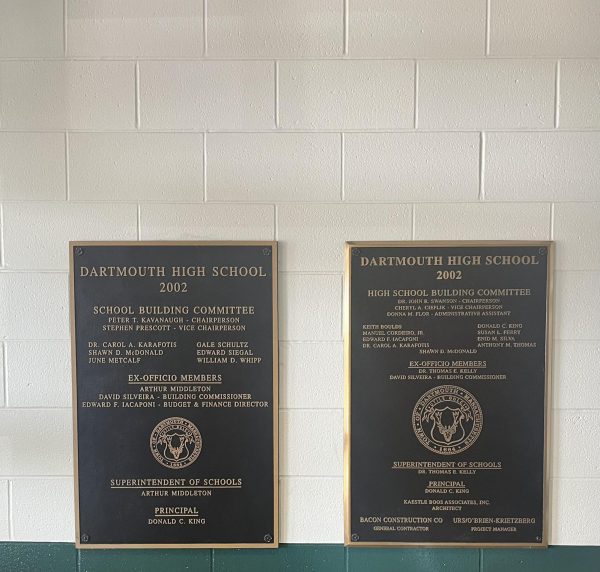Change is in the air at DHS
These final, exasperating weeks of school have brought on much anticipation of a stress-free summer. During this time, many rumors have been spread within DHS pertaining to the alleged changing of many well-liked and traditional policies, including the senior final exam exemption policy, the student parking policy, and the running of certain AP courses.
Dean of Students Michael Martin informed the Principal’s Advisory Council that an executive session between the lead teachers and administration was held a few weeks ago to discuss the issue of how to calculate growth in classes with pretest and posttest data. Some teachers brought up the concern that because the seniors who have 90 averages or above in their classes are excluded from taking the final, their data for assessing growth was not exact because not all the kids in that class were being tested. Teachers often found a dip in their data determined measures once the seniors with 90 averages left.
Mr. Martin stated that this topic was only briefly discussed at this executive session and nothing had been officially decided on the issue. Quite frankly, students weren’t really supposed to know that this was being discussed. However, word of it somehow leaked to the students, and from there, a wildfire of gossip was ignited.
Students saw this policy as a true benefit in that it pushes seniors to work harder to maintain an A, it helps students to bring their grades up in general, and research has shown that most schools with this policy see a reduced number of tardies and absences in the second semester among seniors.
In response, the Student Council officers constructed a petition proposing why they believed it was worth it to keep this policy. The Principal’s Advisory Council also met and discussed the issue with Mr. Martin.
“This is something that motivates students to work harder throughout the year, especially during the second semester,” said junior class President Bryce Boswell. Almost all students shared the same views that this policy really only offered benefits to the majority of the student body.
By the end of meeting, Mr. Martin listened to us and said, “I think you guys have actually swayed me to your side.”
As student representative to the school committee, I spoke up at the school committee meeting on June 8 about the issue, making the community aware that we had a petition and were ready to do whatever it took to fight for and ultimately keep this policy that we so strongly supported.
Principal John Gould then came to the podium and confirmed that the removal of the policy was only something briefly discussed, and that nothing had yet been solidified. The Senior Final Exam Exemption Policy will remain the same for the 2015-2016 Student Handbook.
It has also recently been the concern of the administration that the current student parking policy isn’t the best one. Currently, students are assigned a specific parking spot when they purchase a parking pass. That is their spot for the rest of the year. Rather than dividing the year up between two payments of $30 each semester, students will now have to pay either $60 right away in the first semester when they purchase their parking pass, or they will have to wait until after Christmas break when they will only have to pay $30 for that final semester.
Administration has decided to change this because many students paid for their spot for first semester, but not second semester, allowing them to get away with parking all year long for only $30. This new policy will enforce a fairer and unified system of payment throughout the student parking system.
In addition, Mr. Martin suggested that we change the system to first come-first serve. “It can help reduce the number of tardies by encouraging students to get to school earlier,” said Mr. Martin at the Principal’s Advisory meeting.
Needless to say, many students disagree with this change.
“I don’t understand why it has to change,” said junior Caroline Baglini. “It’s fine just the way it is.”
Mr. Martin reasons that he doesn’t feel as if it is fair to the students who have to park by the tennis courts when there are some empty spots in the front lot because those kids are absent. In addition, some students park in the wrong spots, which causes other students to park in the wrong spots, and that creates a domino effect. The first come-first serve parking wouldn’t require as much regulation of the spots.
Nonetheless, for the sake of senior privilege, regularity, and routine, as well as safety, most students have pushed to keep the policy the same way it is now.
We also feel that the number of tardies in the school may increase because students will be too busy driving through two parking lots looking for an open space to actually be able to get into school before the bell rings.
In response, Student Council Treasurer Jenn Wheaton created an online survey that asked students which parking option they wanted. Almost all of the students chose to have the assigned parking option. Mr. Martin recognized that assigned parking was what students wanted and agreed to keep parking as it is now. “We are really going to try to monitor it,” said Mr. Martin. “It’s not fair to take someone else’s spot.”
Students should be prepared to follow the written parking rules.
Another topic of discussion was that some AP classes were going to be cut because not enough students had signed up for the classes. Principal Gould told the Principal’s Advisory Council that an AP class needs a minimum of 15 people so that it can run as a class.
Mr. Martin explained that classroom instruction varies depending on the class size. “Looking at it from an equity issue. It’s hard to run classes with ten kids as opposed to classes with 30 kids,” said Mr. Martin.
Some of the classes that were going to be cut were AP Computer Science, AP Spanish, and AP Capstone/Seminar. Many students were upset.
“Considering they had cut two of the AP’s I wanted to take (AP Environmental Science, AP Government and Politics), it would have been absurd to cut AP Spanish after I’d already signed up for it,” said junior Cooper Smith. Luckily, the administration has recognized our concerns.
“The AP’s are being restored,” said Mr. Gould. Recognizing that cutting these AP’s would be unfair to the students, administration decided to allow them to run. AP Spanish, AP Computer Science, AP Seminar, and AP Spanish will run. AP Environmental Science and AP Government and Politics will be offered once again in the 2016-2017 school year. They will not run next year.
The dreaded discussion of schedule change still lingers. If the schedule were to change, the soonest it would happen would be in the 2016-2017 school year, but still, nothing is definite. The schedule change would have to be part of a collective bargaining agreement between the school and teachers that expires in 2016.
“We want to achieve a quality education across the board,” said Mr. Martin. “We want common planning time. We want to collaborate together on student work and assess it and see where we can do better. We are looking for a continuity of instruction.”







